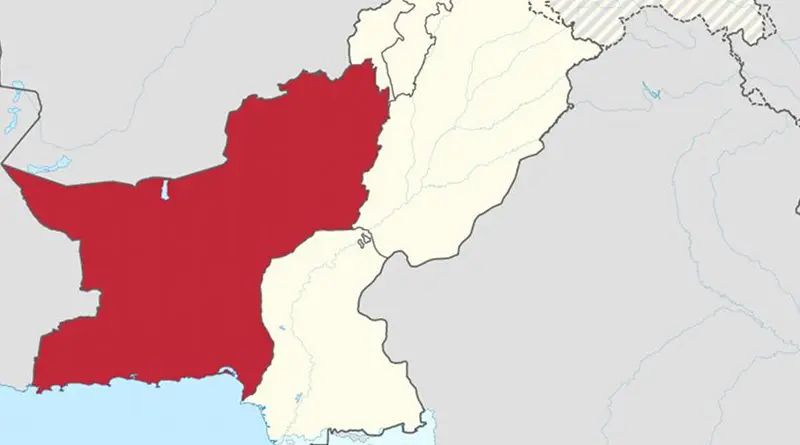Balochistan And Dissident Movements – OpEd
By Sehrish Khan
Balochistan is the largest province of Pakistan in terms of area, which constitutes 43.6% of the total area of Pakistan, while its population was 65,65,885 people according to the 1998 census. Balochistan, rich in natural resources, is the most important province in its location. It is bordered by Afghanistan, Khyber Pakhtunkhwa province in the north, Arabian Sea in the south, Sindh and Punjab in the east and Iran is located in the west. It has 832 km long border with Iran and a 1120 km long border with Afghanistan. 760 km long coastline is also in Balochistan. Thus, Balochistan is the richest province in terms of natural resources but unfortunately due to interference of some hostile elements in the region, it hasn’t relish a normal life.
On April 2, 2014, Dr. Ali Al-Ghamdi, an expert on Southeast Asian affairs and former senior Saudi diplomat, wrote in his article “Baluchistan and the Unity of Pakistan” in Saudi Arabia’s three-decade-old English newspaper “Saudi Gazette”. According to him, Baloch Liberation Army (BLA) is full of insurgency against Pakistan as a threat to divide the national unity. This militant group has established relations with foreign powers. Moreover, a big tribal leader tried to raise the issue of Balochistan in the International Court of Justice some time ago on the promise of 20 million dollars from a neighboring country of Pakistan. Three members presented a bill. It was said in the bill that “Baluchistan is currently divided between Pakistan, Iran and Afghanistan, which is not being given the rights of supreme power.” Extrajudicial killings and eviction from native areas are faced. A Congress committee held meetings on the so-called human rights violations in Balochistan and proposed a new road map for partitioning some Central Asian countries, including Pakistan, on consular, regional, linguistic and communal lines. Foreign countries have been putting constant pressure on Pakistan so that under the pretext of a diplomatic mission it can sit inside Balochistan and covertly patronize the organizations that destabilize Pakistan. He believes that the all the hostile elements inside Pakistan are working hard to separate Balochistan province of Pakistan and establish an independent state there.
For this purpose, huge sums of money are coming into the pockets of the tribal chiefs from the neighbouring country in the form of financial assistance to the Baloch militants. The observations of the former Saudi diplomat are not new. On September 30, 2013, India’s defense analyst, Dr. Amarjit Singh, in his long article “How to make Proxy War succeed in Baluchistan” in Indian Defense Review, referred to the uprisings in different countries and suggested that the Indian government should start an Indian proxy war in Baluchistan. Dr. Amarjit Singh believes that the Indian proxy war in Balochistan is affecting about 40 percent of Pakistanis.
According to Dr. Amarjit Singh, the India abducted and disappeared the separatists in Nagaland in 1960 and Indian Punjab in 1980 and crushed the separatist movements in both provinces with such tactics, due to which these areas still belong to India. However, he is afraid that the Pakistani government may not control the insurgency of Balochistan like the India. So, Dr. Amarjit Singh advised the Indian government that the Indian Army should continue to fire its guns towards Pakistan on the 1850-mile-long Pakistan-India border so that by keeping the them busy on the eastern borders, its attention could be diverted from Balochistan. There are several Indian embassies and consulates across Pakistan’s western border that reflect India’s nefarious intentions.
The international community has developed a consensus to bring terrorists to justice and UN has passed many resolutions in this regard. Militants have no refuge in the world, however, quite strangely, Baloch dissident leaders, responsible for heinous terrorist attacks against general masses in Balochistan have got asylum in various countries. It clearly indicates that Baloch dissident movements have foreign support.
Some hostile foreign elements are also showing strong opposition to CPEC and they are targeting Chinese persons working on mega-projects in Balochistan. The terrorist attacks on Chinese interests in Balochistan has links with global trade wars. Pakistan has shared dossiers containing proof of Indian involvement in terrorism with UN and international community. People of Pakistan expect from them to take appropriate action against the hostile elements and help to bring terrorists to justice. People of Balochistan are politically very aware and they will not support dissident leaders for their foreign ties and foreign sponsorship.

